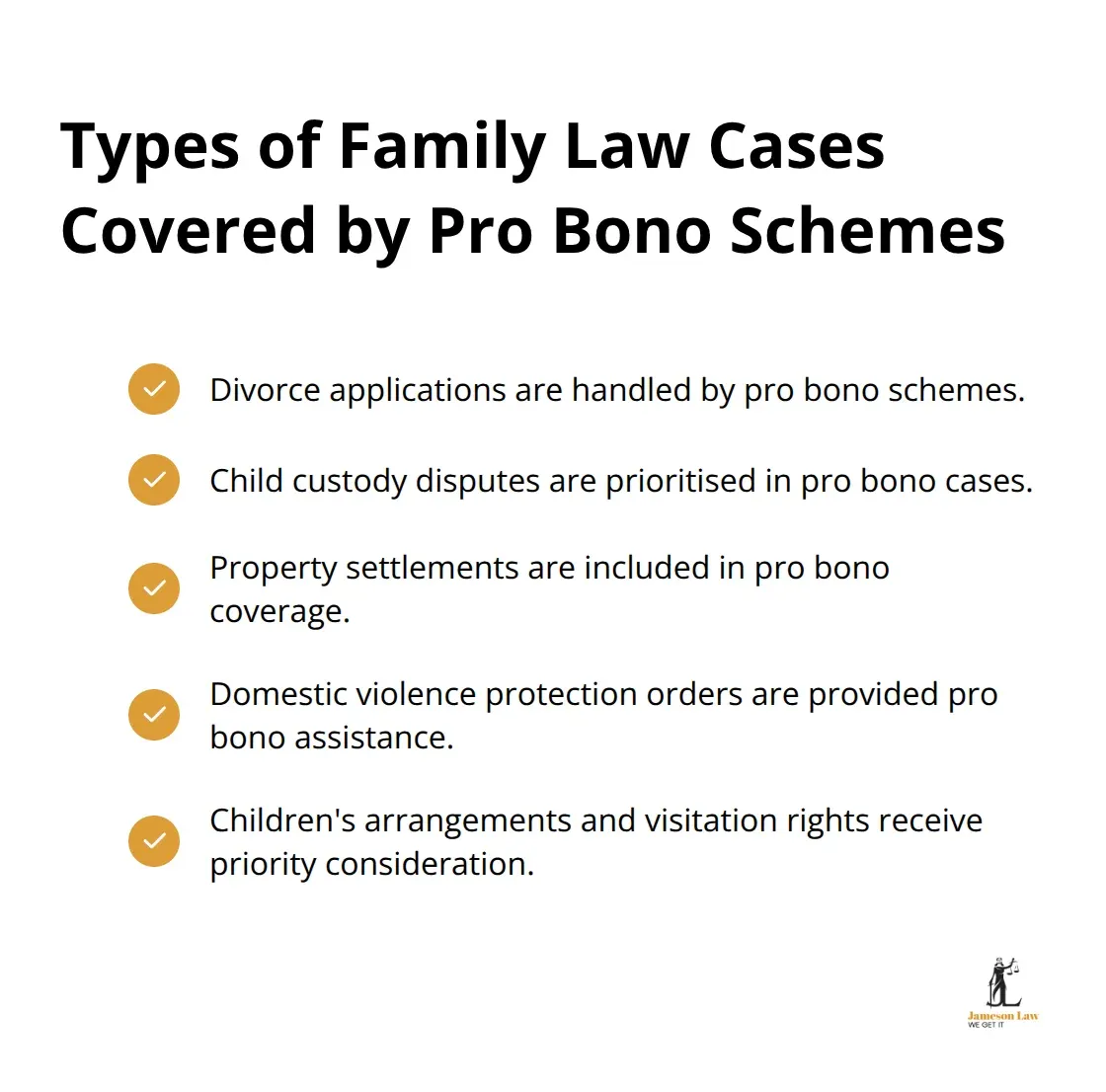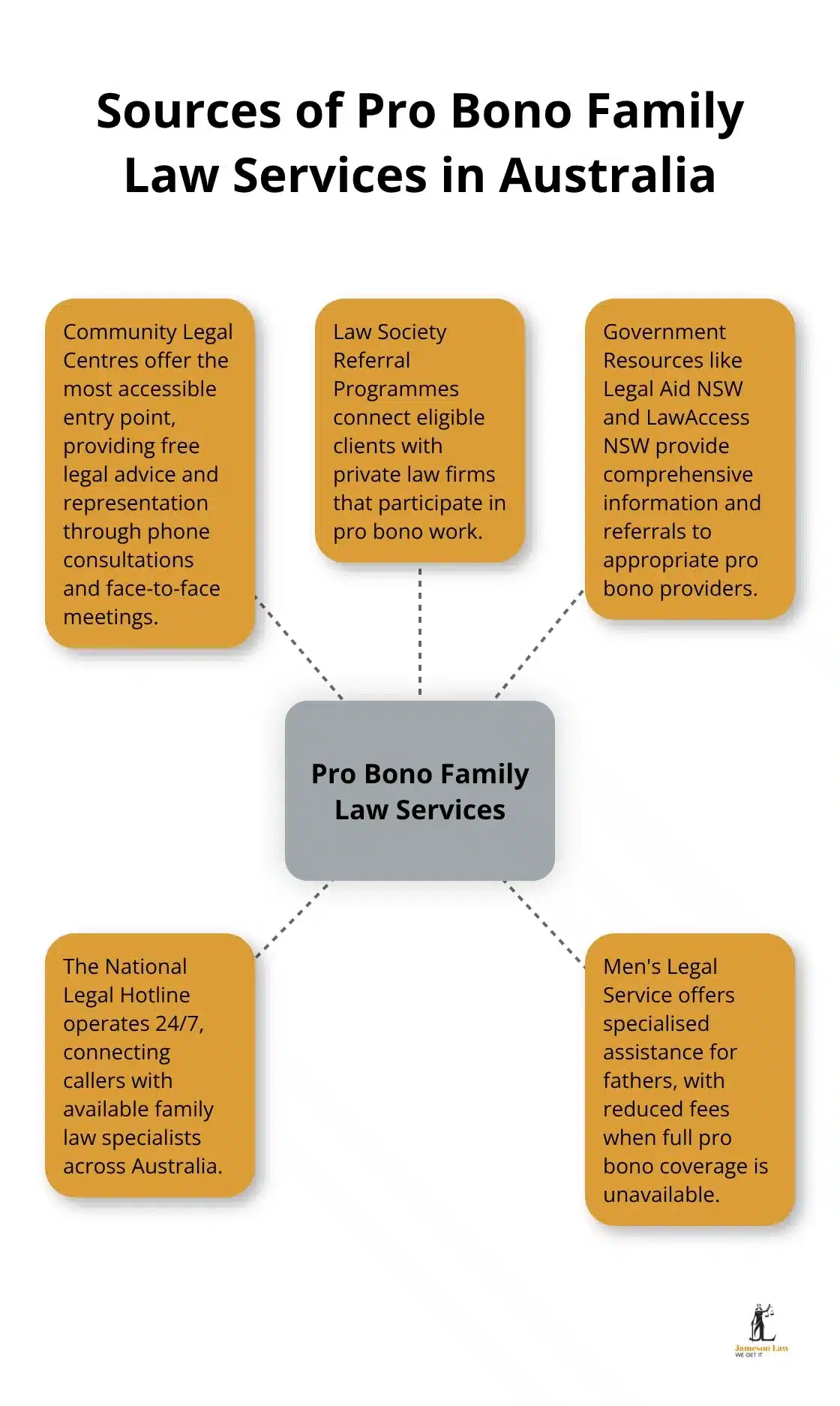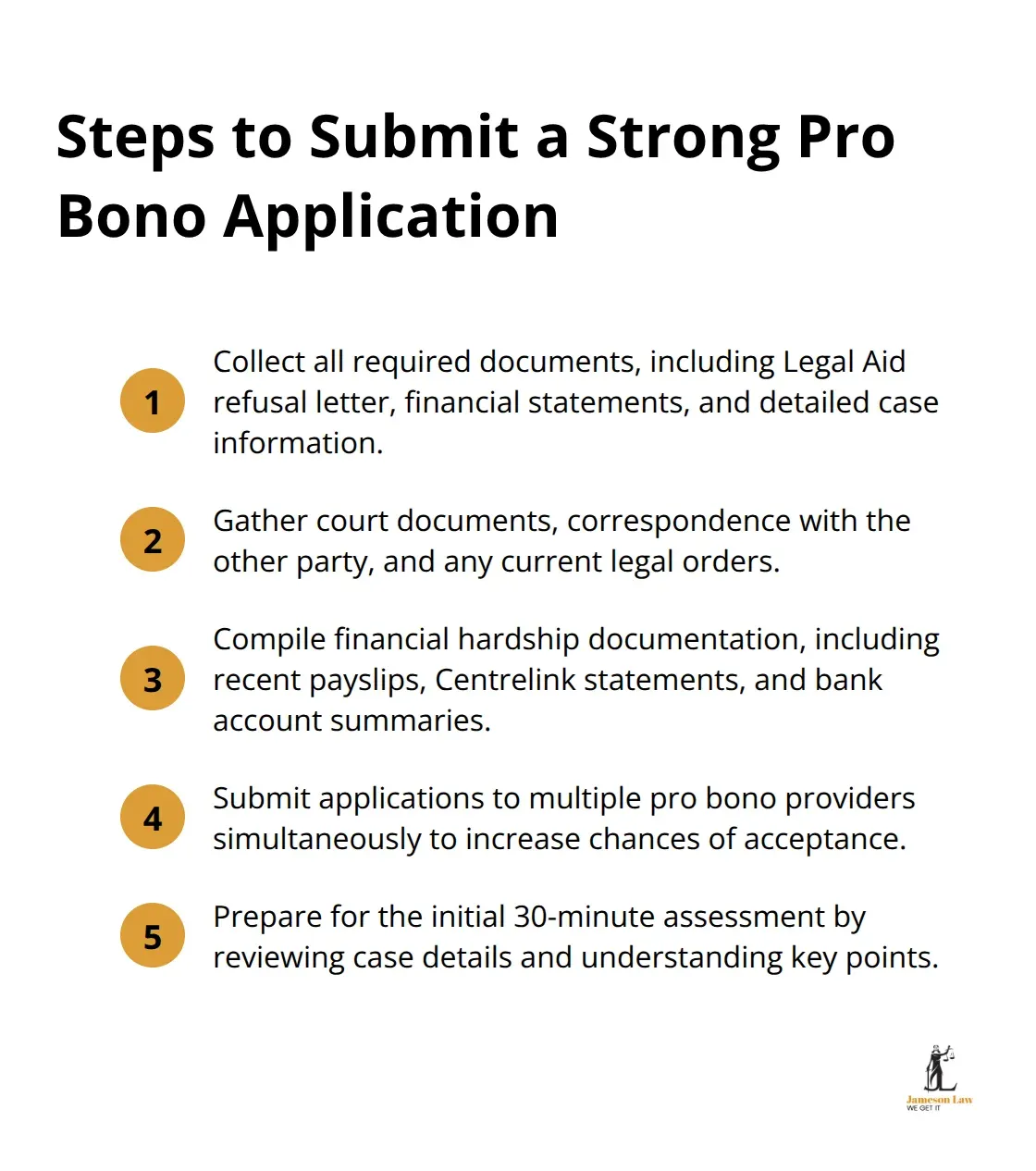Family law matters can drain your finances quickly, leaving many people unable to afford legal representation when they need it most.
Pro bono family law services offer free legal assistance to those who qualify, covering everything from divorce proceedings to child custody disputes. We at Jameson Law understand how overwhelming it can feel to navigate the legal system without proper support.
The good news is that numerous organisations across Australia provide these services to eligible families.
What Are Pro Bono Family Law Services
Definition and Scope of Pro Bono Legal Work
Pro bono work means lawyers provide free legal services to people who cannot afford representation. The Law Society of NSW Pro Bono Scheme can connect you with firms willing to act for free or at a reduced fee. Unlike Legal Aid (which applies strict government criteria), pro bono services run through voluntary participation by private law firms.
Most programs ask you to show a Legal Aid refusal or that your matter falls outside Legal Aid coverage. This voluntary system creates both opportunities and limitations for people who need help.
Types of Family Law Cases Covered
Pro bono schemes typically cover divorce applications, parenting arrangements, property settlements, and domestic violence protection orders. Some schemes exclude child support disputes (as these are handled under different government programs). Matters involving children’s living arrangements and time with each parent often receive priority.
Applications usually must show reasonable prospects of success and genuine merit. Assessment commonly takes around ten business days, depending on volume and complexity.

Eligibility Requirements for Pro Bono Assistance
Most pro bono programs target people facing significant financial hardship who cannot access other options. You’ll generally need supporting documents, including any Legal Aid refusal. Priority is often given to people experiencing family and domestic violence, homelessness, or other forms of vulnerability.
The referral form must be complete to avoid delays. Where full pro bono is unavailable, organisations such as Men’s Legal Service sometimes offer reduced fees (about 25%–33% of standard rates), making affordable family law services more accessible.
Where Can You Access Pro Bono Family Law Services
Community Legal Centres Provide Direct Access
Community Legal Centres (CLCs) operate across Australia and are a common entry point for free family law help. Many provide phone advice and face-to-face appointments at outreach locations. The Family Advocacy and Support Service (FASS) assists people experiencing family violence inside the family law system. While CLCs aim to help those most in need, some centres apply eligibility criteria or triage due to high demand. Typical issues include divorce, parenting, property, and safety planning.
Law Society Referral Programs Connect You with Private Firms
Each state’s Law Society runs referral programs matching eligible clients with participating firms. In NSW, the Pro Bono Scheme assesses merit and hardship, with timeframes commonly around ten business days (complex cases may take longer). In Queensland, LawRight’s Pro Bono Connect prioritises public interest and hardship matters. Complete documentation—such as Legal Aid refusal and financials—improves your prospects. Family matters involving children are often prioritised over pure property disputes.
Government Resources Supplement Private Options
Legal Aid NSW provides resources and referrals even when it cannot fund a case. LawAccess NSW offers free legal information and referrals by phone (1300 888 529) and online. Men’s Legal Service provides targeted assistance for fathers, and when full pro bono isn’t available, they may offer reduced-fee options. These services keep up-to-date panels to help match your case with suitable expertise.

Once you identify potential providers, the next step is preparing a strong application that clearly shows both eligibility and merit. If you’re exploring affordable family law services beyond pro bono, there are additional ways to manage costs effectively (e.g., fixed fees or limited-scope representation).
How Do You Submit a Strong Pro Bono Application
Collect All Required Documents First
Your chances improve with complete documentation. Typical packs include a Legal Aid refusal letter (if applicable), financial statements (income, assets, liabilities), and case documents (court orders, applications, correspondence). Financial hardship evidence should include recent payslips or Centrelink statements plus last three months of bank statements.
Apply to Multiple Providers at Once
Submit to several suitable providers at the same time rather than waiting sequentially. CLCs may offer triage appointments quickly; Law Society schemes require formal forms and attachments; LawRight (QLD) accepts online applications. Where full pro bono is unavailable, reduced-fee services can bridge the gap.
Prepare for Your Initial Assessment
First appointments focus on screening and eligibility rather than full advice until you are accepted. Expect detailed questions about finances, previous attempts to obtain legal help, risks (e.g., family violence), and case merits. Have a short timeline, key documents, and your goals ready. Providers weigh public interest, hardship and prospects of success against their capacity before confirming a referral.

Final Thoughts
Pro bono family law services connect eligible families with free representation via Community Legal Centres, Law Society referral programs, and government-supported pathways like LawAccess NSW. Deadlines in family law are strict—particularly around parenting and property—so applying early is essential.
If pro bono isn’t available, reduced-fee options and fixed-fee scopes can keep matters moving. We at Jameson Law help clients understand their options and prepare stronger applications. If you need tailored advice on divorce, parenting arrangements, property settlements or domestic violence orders, contact our team for practical, compassionate support.
General information only — not legal advice.













